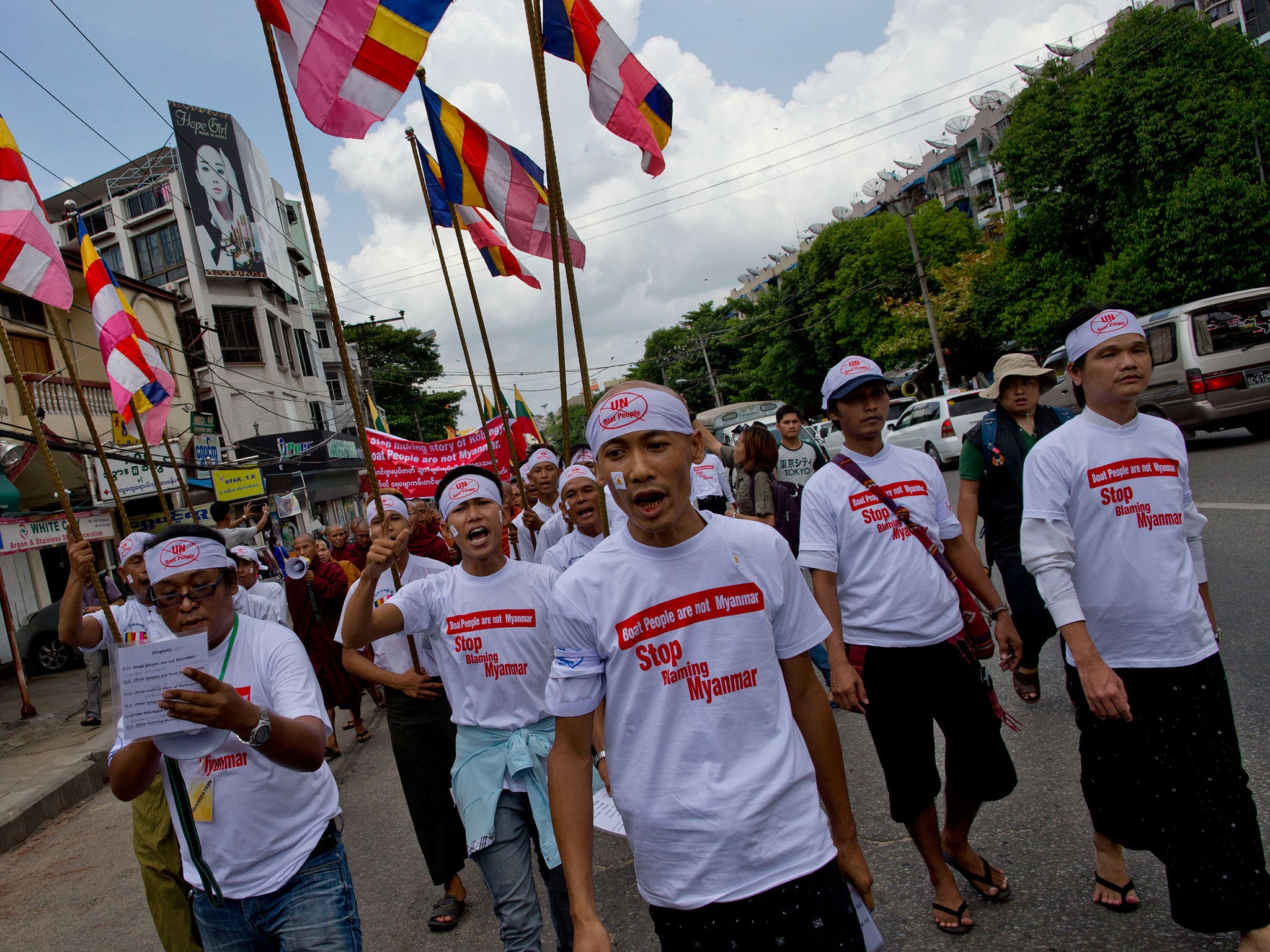Burma protesters march in capital Rangoon angry at country being blamed for Rohingya crisis
Demonstrators insisted the Rohingya are an invented ethnicity and demanded that the boat people be sent to Bangladesh

Nearly eight years ago, hundreds of thousands of Burmese monks defied the military regime and marched in barefoot protest through the streets of Rangoon. The press called it the Saffron Revolution. The spectacle, repeated across the country, was the indelible image of a country in the grip of dramatic change.
Barefoot monks again marched through Rangoon but in smaller numbers, and for a different cause: to protest against the blaming of Burma for the boat people crisis, to insist that the Rohingya are an invented ethnicity, and to demand that the boat people be sent to Bangladesh, where (in the protesters’ minds) they rightly belong. The authorities gave the march a green light. The police were conspicuously absent.
Here was the chauvinistic face of Burmese Buddhism – the protest was organised by a new monastic set-up called the Association for the Protection of Race and Religion, known as Ma Ba Tha – but amply supported by ordinary citizens.
As protesters mustered near the old racecourse in central Rangoon, a man who declined to give his name said: “The people on the boats in trouble are not really from Burma. They are from Bangladesh. Our people don’t want these Bengali boat people. I am not a politician, I cannot solve the problem, but I can show my desire. We want to send a message to the international community. We don’t want them.”
A female protester, Sandy Thin Mar Oo, said: “It’s obvious these boat people are from Bangladesh, but why doesn’t [the international community] pressurise the Bangladesh prime minister or Bangladesh organisations? They want to accuse Burmese people and Burmese government all the time. It’s not fair… The whole world is lying and pressuring Burma, but the truth will come out sooner or later.”
A middle-aged monk, U Naga Wuntha, rammed home the point. “The international community says these boat people are from Burma but they are not Rohingya, they are from Bangladesh. Our country is a very peaceful country. Burmese people care for any people who are in trouble, so it’s not fair for the international community to say otherwise.”
Three connected grievances simmered at the protest: dismay at what was seen as the unjust targeting of Burma as the cause of the crisis; a deep-seated animus against Muslim Bangladesh, with which Burma shares a porous border; and indignation that what Burmese believe, with some justice, to be the questionable “ethnicity” of Rohingya, has become a rallying cry for humanitarians around the world. Lost in the emotion was the fact that hundreds of thousands of Muslims have lived in Arakan state in poverty and without rights for generations – which is why many of them will do whatever it takes to get out.
It’s a desperate reality which Burma goes to great lengths to ignore. For the past week, local media in Burma have reported the interception by the Burmese navy of a traffickers’ boat off Burmese waters, supposedly with 200 Bangladeshis aboard. It was later reported they were soon to be repatriated to Bangladesh. But on Tuesday it emerged that, before the Burmese navy arrived on the scene, an equal number of Rohingya had been spirited off the boat and back to their Burmese villages.
The supposed presence on the boat of Bangladeshis and no one else helped to bolster the notion that the Rohingya have no reason to flee and are not among the boat people – so Burma has no duty to care for them. Last week US Deputy Secretary of State Antony Blinken, on a visit to Burma, said the majority of the boat people were Rohingya Muslims “fleeing from the desperate conditions they face” in Arakan state. The state’s Chief Minister, Maung Maung Ohn, retorted: “I completely disagree and reject, such unfounded allegations by the United States.”
It is in this atmosphere of rancour and denial that Burma will sit down in Bangkok with 16 other nations including its Asean alliance partners Thailand, Malaysia and Indonesia, to try to thrash out a solution to what has been described as the biggest crisis the organisation has faced, with more than 2,000 migrants reportedly still at sea.
Thailand’s Foreign Ministry said in a statement: “It is an urgent call for the region to comprehensively work together to address the unprecedented increase of irregular migration across the Bay of Bengal in recent years.”
But with Malaysia still combing 139 shallow graves in 28 suspected people-smuggling camps, and with all the South-eastern neighbours set against taking survivors on a permanent basis, the political capital needed for a resolution appears to be wanting.
Asean has a strict ban on interference in member states’ internal affairs. Burma’s participation at the conference was only secured with the promise that the word “Rohingya” would be barred from discussions. And the nation’s amour propre is unlikely to be ruffled by any finger pointing: at an Asean summit in 2007, the threat of a walkout by then Burmese Prime Minister Thein Sein – now President – was enough to silence discussion of the killing of protesting monks by soldiers in the dying days of the Saffron Revolution.
Subscribe to Independent Premium to bookmark this article
Want to bookmark your favourite articles and stories to read or reference later? Start your Independent Premium subscription today.

Join our commenting forum
Join thought-provoking conversations, follow other Independent readers and see their replies